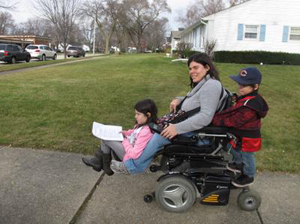By Bonnie Rochman | TIME magazine
Two years ago, Erika Johnson gave birth to her first child. When she had trouble breast-feeding, a nurse soothed her by saying that many mothers find nursing hard at first. Then the nurse called social services.
Johnson and her husband are both blind, which concerned the nurse and caused a social worker to put their baby Mikaela in foster care for 57 days. “It was sickening that they assumed because we’re blind we can’t take care of her,” says Johnson, who lives in Independence, Mo. “I was angry, upset, sad, frustrated. It was my first child.”
Johnson’s story is just one of many that humanize a 445-page report issued by the National Council on Disability about the myriad ways in which disabled parents encounter discrimination. Nearly 1 in 10 U.S. kids have a parent who is disabled, according to the Council. Of those parents, 4.1 million have children younger than 18. Yet there’s a cultural belief that parents with intellectual or physical disabilities don’t — or shouldn’t — raise kids.
If you’d like to discuss family law, contact with Kaine Fisher, director of Rose Law Group Family Law Department, kfisher@roselawgroup.com.











